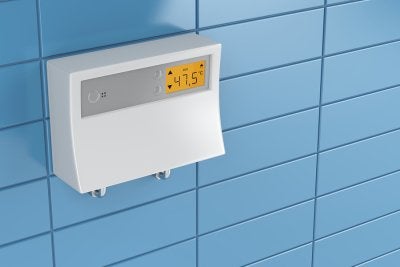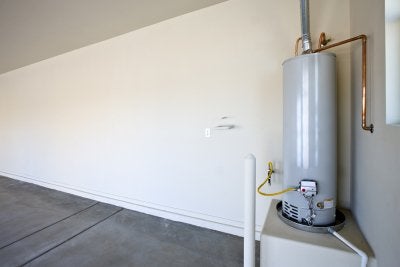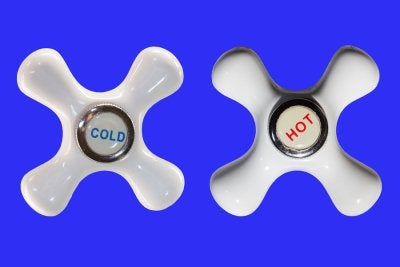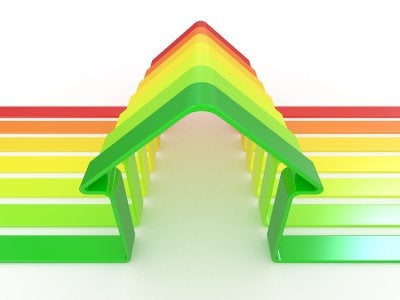-
Finding the Right Water Temperature for Your Tankless Heater
If you’re interested in installing a tankless water heater near Jacksonville , you should contact a plumber for professional water heater installation. When installed and operated correctly, a tankless water heater can save you money on your water bills and energy bills. Tankless water heaters provide instant hot water only when you need it, rather than storing hot water in a tank like traditional water heaters.
Your on-demand water heater will only heat water as needed, thus eliminating the risk of heat loss and water evaporation. Tankless water heaters are available as natural gas, propane, solar, and electric water heaters. Many tankless water heaters come with a remote control that allows you to easily change the set point temperature of the water heater.
Because your tankless water heater does not consume electricity or gas when water is not in demand, you can set the water temperature slightly higher than you would with a traditional water heater. The standard temperature for a tankless water heater is 120 degrees. This temperature allows you to add the right amount of cold water to your shower or tub to quickly and efficiently create the ideal bathing temperature.

-
Keeping Calcium Off Your Faucets
Over time, calcium deposits will build up on your faucets, causing plumbing problems and necessitating plumbing repairs near Jacksonville . You can reduce your need for frequent plumbing repairs by preventing calcium buildup from occurring in the first place. For instance, your plumber can install a water softener to reduce the natural minerals present in your water supply.
Watch this video for some great tips for keeping calcium off of your water faucets. A calcium buildup can cause low water pressure, damaged water appliances, and water leaks. If you have a minor calcium buildup, you can soak your faucet aerator in white vinegar for one to three days. For extreme calcium buildups, a plumber may recommend that you use muriatic acid to clean off the calcium deposits. Once you and your plumber remove the calcium deposits, your faucets will produce a much stronger water flow.
-
Eco-Friendly Bathroom Remodeling Tips
Embarking on a bathroom remodel near Jacksonville is the perfect opportunity to investigate eco-friendly bathroom design options . You can conserve water and energy by hiring a plumber who has experience installing energy-efficient bathroom appliances, like tankless water heaters and low-flow faucets. Here are some eco-friendly bathroom remodeling tips that you can discuss with your plumber or bathroom remodeler.

Focus on water conservation.
You can start by focusing on your daily water use, and how you can reduce or conserve water in your bathroom. A plumber can install a low-flow showerhead and low-flow faucets in your bathroom that will use much less water than standard appliances. You can also install a low-flow or dual-flush toilet to further conserve water. In addition, a plumber can install automatic faucets on your bathroom sinks. This will discourage you from letting the water run continuously while you brush your teeth or perform other tasks. You should also contact a plumber for plumbing repairs, slab leak repairs, and water leak repairs as soon as possible to reduce the amount of water wasted.
Utilize green building materials.
You should also commit to using green building materials throughout your bathroom remodel. Your bathroom remodeler can put you in contact with manufacturers of eco-friendly, sustainable building materials for your bathroom remodel. Ceramic tile and natural stone are great choices for walls and flooring, as they are incredibly durable and won’t need to be replaced often, and are also low-maintenance, requiring little cleaning. You can also use recycled and recyclable materials for flooring, countertops, and cabinetry. Finally, you can use LED light bulbs to conserve energy.
Install an energy-efficient water heater.
Most families use hot water in their bathrooms every day. Traditional water heaters store hot water in a tank and heat it continuously, which can result in heat loss and water evaporation. Tankless water heaters provide instant hot water only when needed, rather than storing it. These on-demand water heaters are incredibly energy-efficient, and can reduce your water usage as well as lower your gas or electric bills.
-
How to Switch to a Tankless Water Heater
Have you been thinking about installing a tankless water heater in your home? There’s no better time to do it than right now. A plumber serving Jacksonville can take out your old standard water heater that is equipped with a large storage tank and replace it with a new energy-efficient tankless water heater that will save you money in the long run and deliver hot water to your home on demand. Check out how to make the switch to a tankless water heater below.

Hire a Licensed Plumber to Inspect Your Plumbing System
When you install a tankless water heater in your home, you will need to do more than just swap out your old water heater. You will need to prepare your entire plumbing system for your new water heater. In some cases, a plumber may decide that it would be more beneficial for you to install smaller tankless water heaters in each bathroom in your home as opposed to simply installing one main whole home tankless water heater. It all depends on how your individual home is set up.
Find the Tankless Water Heater That Is Right for Your Home
Once you have had a plumber take a look at your plumbing system, you should speak with him or her about which tankless water heater would be best for your home. Shop around and look at lots of different tankless water heaters until you find the one that works for your specific situation. It’s important to remember that, while most tankless water heaters will cost more than standard water heaters, your investment will pay off in the end in the form of dramatically lower energy bills.
Install Your New Tankless Water Heater With the Help of a Plumber
You should never attempt to install a tankless water heater on your own. If you don’t install it properly, it could pose a threat to both you and your home. Use a licensed plumber to install your new water heater, and you will typically be able to start using it within a matter of just hours.
-
Should You Switch to a Tankless Water Heater?
Should You Switch to a Tankless Water Heater?
Do you have a standard storage-tank water heater that’s on its way out? If so, you’re probably looking into having it replaced. But with so many options on the market today, which hot water heater is the right one for your home? You could choose to replace your old water heater with another storage-tank model, or you could take the opportunity to switch to a tankless water heater in Jacksonville . Here are some things to consider when making your decision to switch. When in doubt, consult with your local plumber.

What a Tankless Water Heater Is
Like its name suggests, a tankless water heater does not have a storage tank that houses a reservoir of continuously heated water that is available for immediate use. This type of hot water heater is much smaller than its storage-tank cousin, and since it only heats water when needed, it can be relatively energy efficient when compared to a traditional model.
What You Should Take into Consideration
You shouldn’t be too hasty when making the decision to switch over from a standard storage-tank water heater to a tankless one. Be sure to do as much research on tankless water heaters as you can, and talk with a plumbing professional—that way, you can be sure that a tankless water heater is right for you. Before you decide, you should figure out how much hot water you and your family actually use on a daily basis. For example, if you have a large family that requires the use of a lot of heat water, a tankless system may not be a good fit for your home.
The Pros and Cons of Tankless Water Heaters
There are some notable pros and cons regarding tankless water heaters. Pros: Tankless systems don’t take up as much space as standard hot water heaters, don’t need to keep reservoirs of continuously heated water, and may lower your monthly energy bills if you install the right model. Cons: Tankless water heaters cost more upfront to purchase and install than traditional models.
-
Comparing Gas and Electric Water Heaters
If your water heater is kaput, you’ll want to buy a replacement unit as quickly as possible. However, considering the cost of a new water heater and how long you’ll be stuck with it, you’ll do yourself a real disservice if you don’t research your options prior to making a purchase. You might also consider buying a new water heater if your old one is nearing or past its expected life, as this can save you a lot of time and frustration later on. Either way, here are a few things to know about gas and electric water heaters so you can make the right decision for your home. Your Jacksonville water heater installation provider can answer any additional questions you have about buying a new water heater.

Cost
Gas and electric water heaters are similar in the initial purchase price, and as long as your plumber doesn’t need to make any retrofits the installation cost for gas and electric water heaters is also similar. However, there are other factors to consider to get a picture of the lifetime ownership costs of gas and electric water heaters. For example, electricity (as a utility) typically costs more than gas, which means electric water heaters can be more expensive to operate and cost more over the long run.
Energy Efficiency
Another important factor to consider when deciding between a gas or electric water heater is energy efficiency. The efficiency of gas and electric water heaters can be compared by their energy factors (EFs), a number between zero and one that relates to how much of each energy dollar results in heater water. A higher EF indicates higher efficiency and, as a result, lower utility bills and a lower lifetime cost of ownership.
Performance
You should also consider your hot water needs and compare them to the performance you can expect from either a gas or electric water heater. For example, if you run out of hot water quickly because different family members are showering, washing dishes, or doing laundry at the same time, consider a tankless gas water heater (also known as an on-demand water heater) that provides virtually instantaneous and unlimited hot water.
-
Comparing Different Types of Water Heaters
A new water heater is a terrific investment for the comfort and efficiency of your home. When you are shopping for new hot water heater, you will have the option of choosing between a tank or tankless water heater. A conventional tank water heater will offer a lifespan of up to 10 years. When you install a tankless water heater , you can expect your unit to last for more than a decade. This type of water heater creates hot water on demand, and is among the most efficient types of hot water heaters available. When you are ready to install a tankless water heater in Jacksonville, be sure to contact a company offering highly rated plumbing repairs. For a comparison of different types of water heaters, check out this video from Howcast.
-
How Tankless Water Heaters Work
If you’re thinking about replacing your old water heater, consider upgrading to a tankless unit instead. These revolutionary water heating units provide instantaneous and unlimited hot water, all the while requiring less energy than conventional models. In other words, you’ll lower your energy bills while enjoying on-demand hot water anywhere in your home, even if you decide to take a hot shower while the laundry machine and dishwasher are running. Before you contact a water heater installation company in Jacksonville , read this brief article to get an idea of how tankless water heaters work.

Heat Exchanger
Tankless water heaters, also known as on-demand water heaters, provide piping-hot water when you want it thanks to a powerful heat exchanger. A heat exchanger is simply a device that transfers heat from one source to another. In a tankless water heater, the heat exchanger transfer heat generated by electric coils or a gas-fired burner to the water that comes out of your faucet. The heat exchanger inside a tankless water heater is activated by the incoming flow of water, which eliminates standby heat loss and makes tankless systems more efficient than conventional water heaters.
Point-of-Use vs. Whole-House System
Tankless water heaters come in two varieties: point-of-use and whole-house heaters. Point-of-use water heaters are more compact and used to heat water for one of two outlets only. Whole-house systems, on the other hand, are larger and can operate more than one outlet at a time. This means no more fighting in your house about who gets to take a hot shower next or who used up all the hot water.
If you think a tankless water heater is right for your home, contact a Jacksonville plumbing company that specializes in water heater repair and replacement. Your plumber will help you select the perfect unit based on your household’s hot water needs.
-
Tank vs. Tankless Water Heaters
If your water heater is more than 10 years old, it’s time to start thinking about buying a new unit. When shopping for water heaters, you will have two types of models to choose from: conventional tank-style water heaters and tankless water heaters. There are pros and cons to each type of water heater, and choosing the right model for your home is a matter of efficiency, sizing, purchase costs, and installation costs. An experienced plumber at Eagerton Plumbing in Jacksonville can can help you wade through your choices to make the best decision for your home and install your new water heater.

Tank Water Heaters
Conventional tank-style water heaters require lower up-front costs than tankless water heaters. They are also easier to install and replace than tankless units. A wide variety of fuels are available for tank water heaters, which can be located anywhere in a home. However, while tank water heaters do have lower up-front costs, they have significantly higher life-cycle costs. Standby heat loss is also a major problem with most tank water heaters, which can decrease the unit’s overall efficiency and increase energy bills. Precise temperature control is also problematic with most tank water heaters.
Tankless Water Heaters
Tankless water heaters provide endless and almost instantaneous hot water whenever you want it. In addition to the convenience of unlimited hot water, tankless water heaters also provide more accurate temperature control. Tankless water heaters run only when needed, which helps contribute to lower energy costs and lower long-term water heater repair costs. The downside to tankless water heaters is that they require higher up-front costs, sometimes prohibitively so. The installation of tankless units is also much more complicated and time consuming than installing conventional water heaters. Tankless heaters can also suffer freeze damage if not installed properly. If you are considering a tankless unit for your home, consult with a tankless water heater installation provider in Jacksonville for assistance.
-
Factors to Consider when Choosing a New Water Heater
Choosing a new water heater for your home is a very important decision. The water heating system you choose for your home will not only affect your comfort but also your monthly energy bills. If you’re having trouble deciding which model is best for your needs, your Jacksonville water heater installation professional can help you sort through your options. Here are some important factors to consider when choosing a new water heater.

Fuel Type
When selecting a new water heater, it’s important to consider what fuel type you will use. The fuel type will not only affect the annual operation costs but also the water heater’s size and energy efficiency. Electric and natural gas/propane water heaters are the most widely available in the United States. Solar and geothermal energy are also used to fuel water heaters. Talk with your plumber or water heater replacement provider for more information about the different fuel types available.Energy Efficiency
Heating water accounts for approximately 15 percent of a home’s energy use. To maximize your energy savings, research high-efficiency water heaters and find out what factors are used to measure energy efficiency. Water-heating efficiency is measures by an Energy Factor (EF) rating—the higher the EF, the more efficient the water heater. Compare the performance and operating costs of different water heater models using the EnergyGuide label to estimate your annual operating costs and savings.Storage Capacity
The capacity of a water heater is an important consideration when investing in a new water heater. For tankless water heaters, you need to determine the flow rate and the temperature rise you’ll need for its application in your home (whole house or a remote application, for example). For storage water heaters, look at the water heater’s first hour rating and choose a model with a rating that matches your peak hour demand. Your Jacksonville water heater installation professional can help you estimate your required storage capacity.
RECENT POSTS
categories
- Uncategorized
- Water Heater Installation
- Tankless Water Heater
- Plumbing Services
- Bathroom Remodeling
- Hot Water Heater
- Plumber in Jacksonville
- Water Heater Repair
- Eagerton Plumbing
- Eco-Friendly Plumbing Repair
- Water Damage
- Plumbing Leak
- Sewer Line Repair
- Infographic
- Clogged Drains
- Kitchen and Bathroom Remodel
- Bathroom Plumbing
- Residential Plumbing Services
- Garbage Disposal
- Toilet Repair
- Water Heater Replacement
- Water Conservation
- Emergency Plumbing
- Commercial Plumbing Services
- Kitchen Design Inspiration
- Kitchen Remodel
- low-flow toilets
- Leaky Faucet
- Conserve Water
- Drain Pipes
- Kitchen Sinks
- Vessel Sink
- Plumbing Problems
- Water Leak
- Commercial Remodeling Contractors
- Drain Cleaning Services
